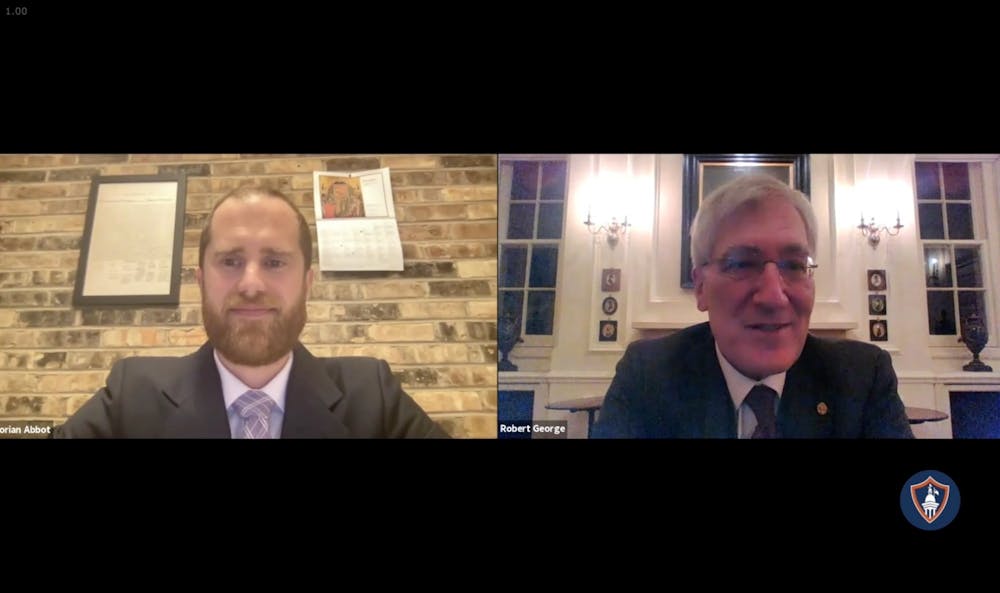Over 4,000 attended a Zoom lecture by University of Chicago Associate Professor of Geophysical Sciences Dorian Abbot on “Climate and the Potential for Life on Other Planets” on Thursday, Oct. 21. The event was hosted by the James Madison Program in American Ideals and Institutions (JMP) after it was canceled by the Massachusetts Institute of Technology (MIT) Department of Earth, Atmospheric, and Planetary Sciences (EAPS).
Abbot sparked controversy within the MIT community because of his public statements against Diversity, Equity, and Inclusion (DEI) initiatives and affirmative action. In Aug. 2021, Abbot, alongside Stanford Associate Professor of Accounting Iván Marinovic, detailed their views in an Op-Ed for Newsweek, which suggested an alternative framework to DEI called “Merit, Fairness, and Equality.” Abbot and Marinovic also compared DEI’s grouping of individuals by race to the “ideological regime obsessed with race” that came to power in Nazi Germany 90 years ago.
Department Head of EAPS Robert van der Hilst explained his personal view of the Op-Ed in an email to The Daily Princetonian.
“Dr. Abbot’s opinions and expressions are well within his right to speak freely, although I think the use of deeply offensive analogies stifles the respectful dialogue that we so badly need,” he wrote.
In an email to the ‘Prince,’ however, Abbot justified the publication of his beliefs.
“I am extremely worried about our ability to do effective science in [an] atmosphere [of] ... illiberalism, intolerance, and censorship,” he wrote. “As a tenured professor in a relatively protected position, it is my duty to speak out in favor of a free society because so many others cannot.”
Abbot was offered the opportunity to speak at MIT in early 2020, prior to the publication of the Op-Ed. Upon hearing of his invitation to speak, members of the MIT community, including Ph.D. student Lyssa Freese, took to Twitter to react. Many people claimed that Abbot’s views do not reflect those of the EAPS department.
“I’m in shock that a department that consistently makes statements about trying to make efforts in DEI would continue forward with this,” she said in her Tweet.

After concerns about Abbot were brought to his attention, van der Hilst consulted MIT students, faculty, and administrators before ultimately deciding to call off the event. On Sept. 30, he decided to cancel the Carlson lecture altogether.
“I felt that with the current distractions we would not be in a good position to hold an effective outreach event,” van der Hilst wrote to the ‘Prince.’ “This particular decision was very contextual, very much hinged to the nature of a particular lecture. Dr. Abbot was never disinvited or canceled and remains welcome to lecture at MIT.”
Abbot expressed disappointment in the EAPS department for the cancellation and described his expectation of how MIT would respond to people attacking him on Twitter.
“I thought [van der Hilst] would say something like: … ‘We've informed the relevant people of the penalties they would face for disrupting an academic lecture, and we're happy to have you,’” he wrote.

“I would have never thought this kind of thing could happen in America,” Abbot added.
In response to the Carlson lecture being canceled, Abbot wrote a column for Common Sense with Bari Weiss in which he called out MIT for “cav[ing] in” to pressure from “Twitter mobs.”
After the lecture cancellation, the JMP invited Abbot to give the same lecture via Zoom on Oct. 21, the day the Carlson lecture was supposed to be hosted by the EAPS department.
Director of the JMP and McCormick Professor of Jurisprudence Robert P. George gave an introduction at the lecture, explaining the unique nature of Abbot’s invitation.
“We at the Madison program, consider this disinvitation by MIT to be chilling to academic freedom and free speech,” he said.
George also called the topic of Abbot’s Op-Ed in Newsweek “a controversial subject on which reasonable men and women of goodwill disagree.”
The topic of the lecture was entirely on Abbot’s research regarding climate change and planetary visualization, and he did not mention the canceled Carlson lecture or any other controversy.
The consequences of this decision, however, span far past just this event. The New York Times, CNN, and NBC all regarded this controversy as reflective of a larger debate on freedom of speech in academia.
David Romps, former Director of Berkeley Atmospheric Sciences Center (BASC) at the University of California, Berkeley, resigned after his colleagues refused to host Abbot. He claimed on Twitter that “excluding people because of their political and social views … reduces the opportunities for learning and collaboration” within the sciences.
“There are very few faculty willing to openly defend academic freedom right now, let alone resign an important directorship in support of it,” Abbot wrote to the ‘Prince.’ “If we had a few more leaders and administrators like Professor Romps, we wouldn’t be having a crisis of academic freedom in our universities.”
Andrew Somerville is a staff writer who corresponds with and covers USG happenings and other campus news. He can be reached at jas19@princeton.edu.
Izzy Jacobson is a news and features contributor for the 'Prince.' She can be reached at ijacobson@princeton.edu and @izzyjacobsonn on Instagram.








